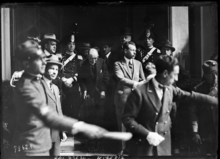Jacques Seydoux
Charles Louis Auguste Jacques Seydoux (born December 30, 1870 in Pau , † May 28, 1929 in Paris ) was a French diplomat and author.
Life
Jacques Seydoux came from a wealthy Protestant family who, originally from Switzerland , settled in northern France at the beginning of the 19th century. Like his father Auguste, his two sons François and Roger were also diplomats. His third son, the geophysicist René, was the great-grandfather of the French actress Léa Seydoux . Together with his wife Mathilde, née Fornier de Clausonne, he had another daughter, Georgette.
After studying law at the École libre des sciences politiques , Seydoux entered the diplomatic service in 1895 after taking the entrance exam as the best in his class . From 1895 to 1898 he was an attaché at the French embassy in London , at a time when mutual relations were extremely tense due to colonial conflicts, and from 1901 to 1905 he was embassy secretary in Berlin .
From around 1906 Seydoux suffered from rheumatoid arthritis , which increasingly limited him physically and eventually confined him to a wheelchair. His illness made further employment abroad impossible, and apart from short business trips, he worked at the Quai d'Orsay , the seat of the French Foreign Ministry, until his early retirement from the diplomatic service on December 31, 1926, also due to illness . During the First World War Seydoux was instrumental in the economic warfare, the economic blockade against Germany. Due to the economic and political experience that Seydoux had gained in this position, it was not surprising that after the war he became head of the economic department in the Quai d'Orsay, the sous-direction des relations commerciales , which was newly created on May 1, 1919 . Seydoux's area of responsibility also included the question of German reparations to the victorious powers of World War I, one of the central problems in international and Franco-German relations in the interwar period . As far as his state of health permitted, he took on a leading position at the reparations conferences in Spa (July 1920), Brussels (December 1920), London (March and May 1921), Cannes (January 1922), Genoa (April – May 1922) and London (July to August 1924), which led to the Dawes Plan .
After leaving the diplomatic service until his death in 1929, Seydoux developed a lively journalistic activity and published more than two hundred articles on foreign policy problems, with a focus on reparations issues and Franco-German relations.
Seydoux played a key role in French foreign trade policy from the First World War until his departure from the Quai d'Orsay and was one of the architects of French reparations policy, who was characterized by "high competence and intimate knowledge of the interrelationships of international politics".
Works
- Jacques Seydoux: De Versailles au Plan Young. Paris 1932.
literature
- Stanislas Jeannesson: L'Europe de Jacques Seydoux. In: Revue Historique. No. 298/1, 1998, pp. 123-143.
- Stanislas Jeannesson: Jacques Seydoux et la diplomatie économique dans la France de l'apres-guerre. In: Relations Internationales. No. 121, 2005, pp. 9-17.
- Stanislas Jeannesson: Jacques Seydoux, diplomate 1870–1929. Paris 2013.
- Nicole Jordan: The Reorientation of French Diplomacy in the 1920s: The Role of Jacques Seydoux. In: English Historical Review. Volume 117, Issue 473, 2002, pp. 870-873.
- Georges-Henri Soutou: The German Reparations and the Seydoux Project, 1920–1921. In: Vierteljahrshefte für Zeitgeschichte . Volume 23, 1975, pp. 237-270.
Web links
- Newspaper article about Jacques Seydoux in the 20th century press kit of the ZBW - Leibniz Information Center for Economics .
Individual evidence
- ^ Stanislas Jeannesson: Jacques Seydoux et la diplomatie économique dans la France de l'apres-guerre. In: Relations Internationales. Volume 121, 2005, pp. 9-17, especially p. 13
- ^ Stanislas Jeannesson: L'Europe de Jacques Seydoux '. In: Revue Historique. No. 298/1, 1998, pp. 123-143, especially p. 125.
- ^ Jacques Seydoux - Family Tree Jean Hervé Favre on Geneanet.org, accessed May 7, 2014.
- ↑ For Seydoux's career data, see: Ministère des affaires étrangères: Annuaire diplomatique et consulaire de la République Française 1927. Paris 1927, p. 323.
- ^ Stanislas Jeannesson: L'Europe de Jacques Seydoux '. In: Revue Historique. No. 298/1, 1998, pp. 123-143, especially p. 125.
- ^ Stanislas Jeannesson: Jacques Seydoux et la diplomatie économique dans la France de l'apres-guerre. In: Relations Internationales. Volume 121, 2005, pp. 9-17, especially p. 13
- ↑ Ralph Blessing: The possible peace. The modernization of foreign policy and Franco-German relations 1923–1929. Munich 2008, p. 63 (= Paris Historical Studies, Volume 76)
- ^ Stanislas Jeannesson: L'Europe de Jacques Seydoux. In: Revue Historique. No. 298/1, 1998, pp. 123-143, especially p. 128.
- ^ Georges-Henri Soutou: Problèmes concernant le rétablissement des relations économiques franco-allemandes après la Première Guerre mondiale. In: Francia. Volume 2, 1974, pp. 580-596, especially p. 583.
- ^ Marc Trachtenberg: Reparation in World Politics. France and European Economic Diplomacy, 1916–1923. New York 1980, p. 163.
- ^ Clemens A. Wurm: French security policy in the phase of reorientation 1924–1926. Frankfurt a. M., Bern, Las Vegas, 1979 (= Europäische Hochschulschriften, Series III, Volume 115), p. 496.
| personal data | |
|---|---|
| SURNAME | Seydoux, Jacques |
| ALTERNATIVE NAMES | Seydoux, Charles Louis Auguste Jacques (full name) |
| BRIEF DESCRIPTION | French diplomat and author |
| DATE OF BIRTH | December 30, 1870 |
| PLACE OF BIRTH | Pau |
| DATE OF DEATH | May 28, 1929 |
| Place of death | Paris |

